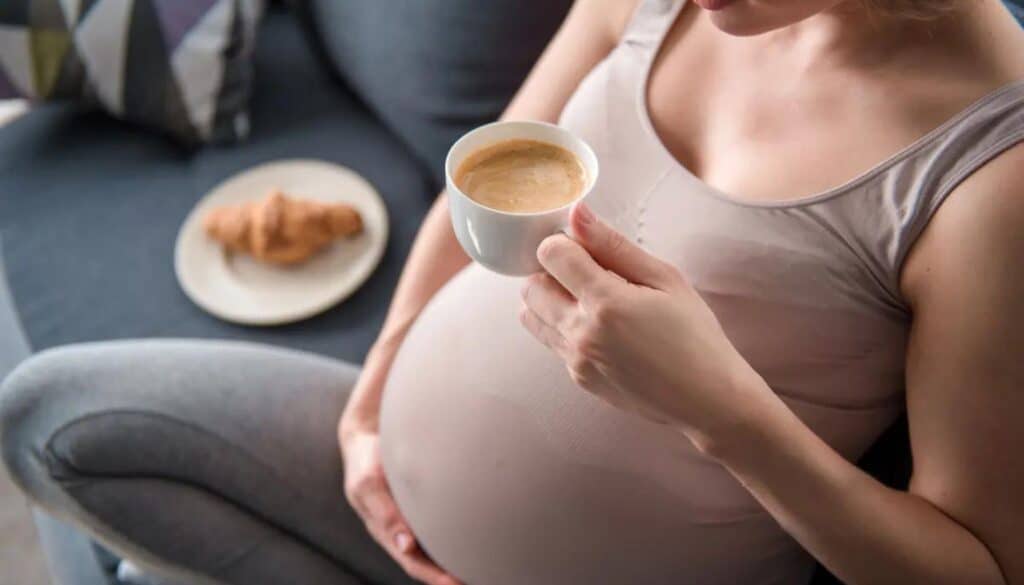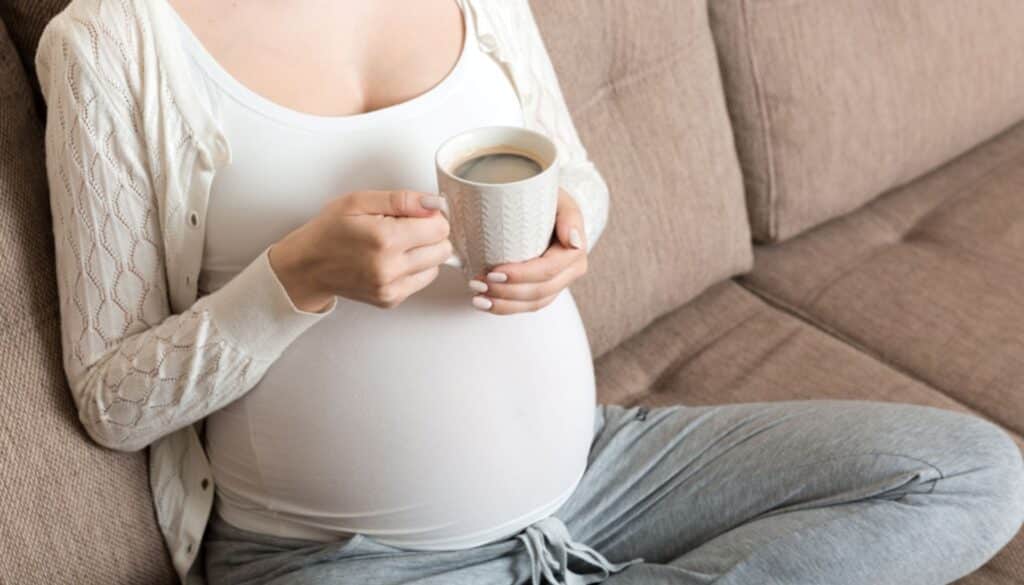Pregnancy is a time of joy, anticipation, and often, a great deal of caution, particularly when it comes to diet and lifestyle choices. Among the various concerns that expectant mothers face, caffeine intake, specifically from coffee, is a topic that frequently arises. The crux of the concern lies in balancing the cherished ritual of coffee drinking with the paramount importance of safeguarding fetal health.
Overview of Common Concerns Regarding Caffeine Intake During Pregnancy
Caffeine, a stimulant found in coffee, tea, chocolate, and certain soft drinks, has been the subject of extensive research and debate when it comes to pregnancy. The primary concerns revolve around its potential to cross the placenta, affecting the fetus, who lacks the mature enzymes necessary for caffeine metabolism. Questions often arise about whether caffeine consumption can lead to miscarriage, low birth weight, or other developmental issues. Additionally, the impact of caffeine on maternal health, including its diuretic properties and its effect on calcium absorption, adds layers of complexity to these concerns.
Brief Explanation of Why Pregnant Women Might Worry About Drinking Coffee
For many, coffee is more than just a beverage; it’s a morning ritual, a source of comfort, or even a means of social connection. The thought of abstaining from or reducing coffee intake during pregnancy can be daunting. Pregnant women may worry about the direct effects of caffeine on their baby’s health, but they also grapple with the challenge of modifying a deeply ingrained habit. The conflicting information available, ranging from studies advocating for strict limitations to others suggesting moderate consumption is safe, further fuels anxiety. This state of uncertainty compels expectant mothers to seek clear, evidence-based guidelines to navigate the safe consumption of coffee during this critical period of life.
In the following sections, we will delve into the effects of caffeine on the body, review the latest research on caffeine consumption during pregnancy, and outline the official guidelines, aiming to provide expectant mothers with the information they need to make informed decisions about their coffee consumption.
Can You Drink Coffee When Pregnant?
During pregnancy, moderate caffeine consumption of up to 200 milligrams per day, equivalent to about one 12-ounce cup of coffee, is considered safe. High caffeine intake can lead to complications such as low birth weight, preterm birth, and miscarriage. It’s important to monitor total caffeine intake from all sources, including tea, chocolate, and soda, and consult with a healthcare provider for personalized advice.
Understanding Caffeine

Caffeine is a familiar stimulant to many, but its effects and sources extend beyond the common cup of coffee. This section explores what caffeine is, where it can be found, and how it influences the body, shedding light on its widespread impact.
What is Caffeine?
Caffeine is a natural compound found in over 60 plant species, acting as a central nervous system stimulant that can temporarily ward off drowsiness and restore alertness. Chemically, it belongs to a group of compounds known as methylxanthines, which have various effects on the body’s cells, including stimulating the heart and respiratory systems and promoting diuresis (increased urine production). Its ability to block the action of a neurotransmitter called adenosine, which promotes sleep and relaxation, is what primarily contributes to its stimulating effects.
Sources of Caffeine: Not Just Coffee
While coffee is the most well-known source of caffeine, this stimulant is found in a variety of other foods and beverages:
- Tea: Both black and green teas contain caffeine, though in varying amounts depending on the type and brewing time.
- Chocolate: Theobromine, a compound related to caffeine, is found in cocoa beans, making chocolate another source of caffeine, especially dark chocolate.
- Soft Drinks: Many carbonated soft drinks and energy drinks contain added caffeine for its stimulating effects.
- Over-the-counter medications: Certain pain relievers, cold medicines, and weight loss pills include caffeine for its ability to increase effectiveness or provide quick energy boosts.
- Dietary Supplements: Some dietary supplements aimed at enhancing energy and focus contain caffeine.
It’s important for pregnant women to be aware of these varied sources to accurately monitor and manage their total caffeine intake.
How Caffeine Affects the Body
The effects of caffeine on the body are multifaceted and can vary greatly among individuals, depending on factors like age, body weight, and tolerance:
- Stimulation of the Central Nervous System: Caffeine’s primary action is as a central nervous system stimulant, increasing alertness and reducing feelings of tiredness.
- Cardiovascular Effects: It can cause a temporary increase in heart rate and blood pressure, making it a concern for individuals with certain heart conditions.
- Diuretic Properties: Caffeine can increase urine production, leading to concerns about dehydration, particularly in individuals who consume large amounts without adequate water intake.
- Effects on Calcium Absorption: There’s some evidence to suggest that high levels of caffeine consumption can interfere with calcium absorption, which is a critical concern for pregnant women.
Understanding these effects is crucial for everyone, but it becomes especially important for pregnant women who need to consider not just their own health, but also the health and development of their fetus. The following sections will delve into the specific considerations and guidelines for caffeine consumption during pregnancy, aiming to provide a comprehensive overview to help expectant mothers make informed decisions.
Caffeine and Pregnancy

Navigating caffeine consumption during pregnancy involves understanding how this period uniquely affects caffeine metabolism and its potential implications for fetal development. Research studies provide insight into outcomes associated with caffeine intake, guiding expectant mothers and healthcare providers in making informed decisions.
How Pregnancy Alters Caffeine Metabolism
Pregnancy induces significant physiological changes, one of which is the slowing down of caffeine metabolism. Hormonal changes, particularly increased levels of estrogen, can extend the half-life of caffeine, meaning it remains in the bloodstream for a longer period. This slower processing rate not only intensifies caffeine’s effects on the mother but also increases the duration of fetal exposure. The fetus, lacking the mature enzymes necessary for processing caffeine, may experience prolonged exposure to caffeine’s stimulatory effects, which raises concerns about its impact on development.
The Impact of Caffeine on Fetal Development
The primary concern with caffeine consumption during pregnancy is its ability to cross the placenta, directly exposing the fetus to caffeine and its metabolites. This exposure can potentially affect fetal development in several ways:
- Growth Restriction: Some studies have suggested a link between high caffeine intake and reduced fetal growth, leading to lower birth weight. The theory is that caffeine may restrict blood flow in the placenta, which can limit the amount of oxygen and nutrients the fetus receives.
- Miscarriage and Preterm Birth: Research has produced mixed results, with some studies indicating an increased risk of miscarriage and preterm birth associated with high levels of caffeine consumption, while others have found no significant correlation.
- Behavioral and Developmental Effects: There is ongoing research into whether maternal caffeine consumption can have long-term effects on a child’s behavior and neurodevelopment, but conclusive evidence remains elusive.
Overview of Research Studies on Caffeine Consumption and Pregnancy Outcomes
The body of research examining the relationship between caffeine intake during pregnancy and various outcomes is extensive yet inconclusive, leading to varied guidelines and recommendations. Key findings include:
- Moderation is Key: Many studies support the idea that moderate caffeine consumption (less than 200 mg per day) is not associated with a significant increase in risk for miscarriage, preterm birth, or low birth weight.
- High Consumption Concerns: Research indicating risks typically focuses on high levels of caffeine intake (over 200 mg per day), drawing associations with increased risks of adverse outcomes.
- Individual Variability: Genetic factors affecting caffeine metabolism may influence individual risk, highlighting the importance of personalized guidance.
Given the mixed findings and the critical nature of fetal development, many health organizations err on the side of caution, recommending limited caffeine intake during pregnancy. The following section will detail these guidelines, providing expectant mothers with a framework for making informed decisions about their caffeine consumption.
Official Guidelines on Caffeine Intake During Pregnancy

When it comes to caffeine consumption during pregnancy, guidance from reputable health organizations plays a crucial role in informing expectant mothers and healthcare providers. Here, we’ll explore the recommendations from the World Health Organization (WHO), the American College of Obstetricians and Gynecologists (ACOG), and highlight some differences in guidelines across countries.
World Health Organization (WHO) Recommendations
The World Health Organization (WHO) has historically taken a cautious stance on caffeine intake during pregnancy. While specific numerical guidelines may evolve, the WHO generally recommends limiting caffeine consumption to minimize any potential risks to fetal health. They have suggested that pregnant women limit their caffeine intake to approximately 300 mg per day in past advisories. However, as research continues to develop, it’s important for expectant mothers to consult the most current WHO guidelines or their healthcare provider for the latest recommendations.
American College of Obstetricians and Gynecologists (ACOG) Stance
The American College of Obstetricians and Gynecologists (ACOG) provides more specific guidance for caffeine consumption during pregnancy. ACOG advises that pregnant women limit their caffeine intake to less than 200 mg per day, which is roughly the amount found in one 12-ounce cup of coffee. This recommendation is based on a review of available studies linking higher levels of caffeine consumption with miscarriage and preterm birth, although it is noted that evidence is not sufficient to warrant a complete ban on caffeine.
Differences in Guidelines Across Countries
Guidelines on caffeine intake during pregnancy can vary by country, reflecting differences in dietary habits, healthcare policies, and interpretations of the scientific literature. For example:
- United Kingdom: The National Health Service (NHS) in the UK aligns closely with ACOG, recommending that pregnant women keep their caffeine intake below 200 mg per day.
- Canada: Health Canada’s guidelines are similar, advising pregnant women to limit their caffeine consumption to no more than 300 mg per day, offering a slightly more lenient guideline than ACOG.
- European Union: The European Food Safety Authority (EFSA) has conducted its own review and suggests that pregnant women limit caffeine intake to 200 mg per day, consistent with ACOG’s stance.
These variations highlight the importance of considering local health guidelines and consulting with healthcare providers for personalized advice. While there is a general consensus that moderate caffeine consumption is unlikely to harm a pregnancy, the definition of “moderate” can vary, emphasizing the need for individualized guidance.
In conclusion, while the exact numbers may differ, the prevailing advice from health organizations around the world is for pregnant women to limit their caffeine intake. By adhering to these guidelines, expectant mothers can help ensure the health and well-being of their developing baby, while still enjoying caffeine in moderation.
How Much Coffee is Safe?

Navigating caffeine intake during pregnancy involves more than just counting cups of coffee. Understanding the caffeine content in various types of coffee, the impact of coffee strength and serving size, and acknowledging other dietary sources of caffeine is essential for maintaining safe levels of consumption.
Translating Caffeine Limits to Cups of Coffee
Given the general guideline from the American College of Obstetricians and Gynecologists (ACOG) recommending less than 200 mg of caffeine per day during pregnancy, how does this translate to coffee consumption? The answer isn’t straightforward, as the caffeine content in a cup of coffee can vary widely depending on the type of coffee bean, the brewing method, and the serving size. Here’s a rough guide:
- Regular Brewed Coffee: A standard 8-ounce (240-milliliter) cup of coffee can contain anywhere from 95 to 165 mg of caffeine.
- Espresso: While stronger, espressos are typically served in much smaller sizes. A single 1-ounce (30-milliliter) shot of espresso might have about 63 mg of caffeine.
- Instant Coffee: An 8-ounce cup of instant coffee usually contains less caffeine, about 30 to 90 mg.
Based on these averages, pregnant women might be able to enjoy up to one 8-ounce cup of brewed coffee or three shots of espresso per day, staying within the recommended caffeine intake limit.
The Importance of Paying Attention to Coffee Strength and Serving Size
Coffee strength and serving size dramatically affect caffeine content. Specialty coffee drinks, such as those from cafes, can vary in both aspects, making it harder to gauge caffeine intake. A large coffeehouse drink could easily exceed the 200 mg caffeine limit with just one serving. It’s essential to be mindful of the specific type of coffee and the size of the serving to avoid unintentional excessive caffeine consumption.
Considering Other Sources of Caffeine in Your Diet
Coffee is not the only source of caffeine in many diets. Tea, chocolate, soft drinks, energy drinks, and certain medications or supplements can also contribute to your total daily caffeine intake. For example:
- Tea: Can range from 20 to 60 mg of caffeine per 8-ounce serving, depending on the type and brewing time.
- Chocolate: Contains varying amounts of caffeine, with darker chocolates having more than milk chocolates.
- Soft Drinks and Energy Drinks: Can contain anywhere from 20 to 80 mg of caffeine per serving, with some energy drinks having much higher amounts.
When considering how much coffee is safe to consume during pregnancy, it’s crucial to account for these other sources. Keeping a food diary or using a caffeine tracker app can be helpful in monitoring total caffeine intake, ensuring that it remains within the recommended limits.
In summary, while moderate coffee consumption can fit into a healthy pregnancy diet, paying close attention to the types of coffee, serving sizes, and other sources of caffeine will help maintain safe intake levels. Always consult with a healthcare provider for personalized advice, especially when considering individual health conditions and dietary habits.
Tips for Managing Caffeine Intake

For expectant mothers looking to manage their caffeine intake while still enjoying their daily routines, there are several strategies and alternatives that can help. Monitoring and reducing caffeine consumption doesn’t have to be a daunting task. Here are some practical tips, along with suggestions for caffeine-free or low-caffeine beverages, and guidance on when it might be necessary to consult with a healthcare provider.
Monitoring and Reducing Caffeine Consumption
- Keep a Caffeine Diary: Start by tracking your caffeine intake to get a clear picture of how much you’re consuming. Include all sources of caffeine, not just coffee.
- Gradually Reduce Intake: If you’re consuming more than the recommended amount of caffeine, reduce your intake gradually to avoid withdrawal symptoms like headaches and irritability.
- Pay Attention to Serving Sizes: Be mindful of the size of your coffee or tea servings. Opt for smaller sizes to naturally reduce caffeine intake.
- Read Labels Carefully: When consuming packaged foods or beverages, check the labels for caffeine content, especially in energy drinks, soft drinks, and chocolate.
Alternative Beverages That Are Safe During Pregnancy
Switching to alternative beverages can help satisfy the ritual of a warm cup in the morning without the caffeine:
- Decaffeinated Coffee and Tea: These can provide the flavor and warmth of your usual cup without the significant caffeine content. However, note that decaf options still contain small amounts of caffeine.
- Herbal Teas: Many herbal teas are naturally caffeine-free. Favorites include ginger, peppermint, and raspberry leaf. However, it’s essential to check that the herbs are safe for pregnancy, as some may not be recommended.
- Fruit Infusions: Infusing water with fruits like lemon, lime, or berries can offer a flavorful and refreshing alternative.
- Warm Milk or Milk Alternatives: A warm cup of milk or a milk alternative (like almond, soy, or oat milk) can be soothing and provide calcium.
When to Consult with a Healthcare Provider About Caffeine Intake
- If You’re Experiencing Difficulty Managing Intake: If you find it challenging to reduce your caffeine consumption, a healthcare provider can offer strategies or support.
- Concerns About Withdrawal Symptoms: For guidance on managing withdrawal symptoms while reducing caffeine intake.
- If You Have Pregnancy Complications: If you have any complications or conditions that might be affected by caffeine intake, such as hypertension or gestational diabetes, discuss your caffeine consumption with your provider.
- For Personalized Advice: Since every pregnancy is unique, consulting with a healthcare provider can ensure that your dietary choices, including caffeine consumption, are tailored to your specific health needs and pregnancy journey.
Managing caffeine intake during pregnancy is about finding a balance that supports both maternal well-being and fetal development. By monitoring caffeine consumption, exploring safe and enjoyable alternatives, and seeking professional guidance when necessary, expectant mothers can navigate this aspect of pregnancy nutrition with confidence.
The Debate: To Drink or Not to Drink

The question of whether or not to drink coffee during pregnancy is one that resonates deeply with many expectant mothers. It’s a topic that not only touches on medical and scientific considerations but also on personal and cultural practices. Within this debate, a range of opinions and experiences come to light, highlighting the complexity of making dietary choices during pregnancy.
Differing Opinions Among Healthcare Professionals
The medical community is not monolithic in its stance on caffeine consumption during pregnancy. While there is a broad consensus around the guidelines provided by organizations like the American College of Obstetricians and Gynecologists (ACOG) and the World Health Organization (WHO), individual healthcare professionals may offer slightly different advice based on their interpretation of the research, their clinical experience, and the specific circumstances of their patients.
- Conservative Approach: Some healthcare providers advocate for a more cautious approach, suggesting that expectant mothers minimize caffeine intake as much as possible due to the uncertain impacts on pregnancy outcomes.
- Moderate Approach: Others may adopt a more moderate stance, emphasizing adherence to established guidelines (e.g., less than 200 mg of caffeine per day) and recognizing that moderate consumption does not significantly increase risks for most pregnancies.
Personal Stories and Anecdotal Evidence
Personal stories and anecdotal evidence play a significant role in the debate over coffee consumption during pregnancy. Many women share their experiences online and in-person, discussing how they navigated the decision to consume or abstain from coffee and other caffeinated beverages:
- Varied Experiences: Some women report choosing to completely avoid caffeine during pregnancy as a precaution, while others share that they continued to enjoy coffee in moderation without any adverse effects.
- Influence of Cultural Practices: Cultural background can also influence decisions about coffee consumption, with some cultures viewing the beverage as a harmless staple and others treating it with more caution during pregnancy.
These personal narratives add a rich layer of context to the debate, illustrating the diverse ways in which women approach this issue based on their values, preferences, and risk assessments.
Balancing Enjoyment of Coffee with Safety Concerns
For many, coffee is more than just a source of caffeine—it’s a ritual, a comfort, or a moment of pleasure in their day. Balancing this enjoyment with safety concerns is a nuanced process that involves:
- Informed Decision-Making: Making informed decisions about coffee consumption requires understanding the latest research, guidelines, and individual health considerations.
- Prioritizing Health and Well-being: The health and well-being of both the mother and the developing fetus are paramount, guiding the decision-making process.
- Personalizing Choices: Recognizing that pregnancy is a deeply personal experience, and what works for one person may not be suitable for another.
Ultimately, the debate over whether to drink coffee during pregnancy is emblematic of the broader challenges of navigating pregnancy advice and making choices that align with one’s health needs, personal values, and lifestyle. Consulting with healthcare professionals, considering the latest research, and reflecting on personal priorities can help expectant mothers arrive at a decision that feels right for them.
Conclusion
The discussion surrounding caffeine consumption, particularly coffee drinking during pregnancy, encapsulates a multifaceted issue that touches on health, lifestyle, and personal beliefs. Navigating this terrain requires a careful consideration of the scientific evidence, individual health circumstances, and personal values. Here, we summarize the key points covered and underscore the importance of seeking personalized advice and making informed dietary choices during pregnancy.
Summary of Key Points
- Understanding Caffeine: Caffeine is a stimulant found in various foods and beverages, including coffee, tea, chocolate, and some soft drinks. Its effects on the body include increased alertness and changes in metabolism, which can be particularly impactful during pregnancy.
- Caffeine and Pregnancy: Pregnancy alters caffeine metabolism, potentially increasing the duration of its effects on both the mother and the fetus. While moderate caffeine consumption is generally considered safe, excessive intake has been associated with adverse outcomes in some studies.
- Official Guidelines: Health organizations such as the WHO and ACOG recommend limiting caffeine intake during pregnancy to below specific thresholds (generally around 200 mg per day) to minimize any potential risks.
- Managing Caffeine Intake: Monitoring and reducing caffeine consumption, considering alternative beverages, and being mindful of all dietary sources of caffeine are practical steps for managing intake during pregnancy.
- The Debate on Coffee Consumption: Opinions among healthcare professionals and personal experiences vary, reflecting a spectrum of attitudes toward caffeine consumption during pregnancy.
Encouragement to Consult with a Healthcare Provider for Personalized Advice
Given the individual variability in health, metabolism, and risk factors, consulting with a healthcare provider is crucial for receiving advice tailored to your specific situation. Healthcare providers can offer guidance based on the latest research, your health history, and any pregnancy-related concerns, ensuring that your dietary choices support both your well-being and that of your developing baby.
The Importance of Making Informed Decisions About Dietary Choices During Pregnancy
Making dietary choices during pregnancy is not just about adhering to guidelines but also about making informed decisions that align with your health needs, lifestyle, and personal beliefs. Understanding the potential impacts of those choices on pregnancy outcomes is paramount. Equipped with knowledge, support from healthcare professionals, and a mindful approach to nutrition, expectant mothers can navigate the complexities of pregnancy with confidence, ensuring the health and well-being of themselves and their babies.
In conclusion, while the question of whether to drink coffee during pregnancy may seem simple on the surface, it encapsulates broader themes of health, autonomy, and the desire to make the best choices for one’s family. By seeking out accurate information, engaging in open discussions with healthcare providers, and considering personal values and health needs, expectant mothers can navigate these decisions with confidence and clarity.
References and Further Reading
- National Center for Biotechnology Information. (n.d.). Caffeine consumption during pregnancy and association with late spontaneous abortion. Retrieved from https://www.ncbi.nlm.nih.gov/pmc/articles/PMC1804190/
- American Pregnancy Association. (n.d.). Caffeine intake during pregnancy. Retrieved from https://americanpregnancy.org/healthy-pregnancy/is-it-safe/caffeine-and-pregnancy/
- American College of Obstetricians and Gynecologists. (n.d.). How much coffee can I drink while pregnant? Retrieved from https://www.acog.org/womens-health/experts-and-stories/ask-acog/how-much-coffee-can-i-drink-while-pregnant
- KidsHealth from Nemours. (n.d.). Caffeine and pregnancy. Retrieved from https://kidshealth.org/en/parents/preg-caffeine.html






